分词作状语--独立主格
- 格式:doc
- 大小:33.00 KB
- 文档页数:3

独立主格结构讲析☆独立主格结构是分词作状语的一种特殊形式:分词(短语)作状语时,无论是现在分词还是过去分词,是一般式还是完成式,其逻辑主语必须与句子的主语保持一致。
否则,分词前必需有自己的主语,即用独立主格结构。
独立主格结构的特点:﹡独立主格结构的逻辑主语与句子的主语不同,它独立存在。
﹡独立主格结构一般有逗号与主句分开。
① The moon appearing, they decided to go on with their journey.② His mother being ill, he had to stay home to look after her.一、独立主格结构的概念独立主格结构(Absolute Structure)是由名词或代词加上分词等构成的一种独立结构,用于修饰整个句子。
独立主格结构中的名词或代词与其后的分词等构成逻辑上的主谓关系。
这种结构与主句不发生句法上的联系,它的位置相当灵活,可置于主句前、主句末或主句中,常由逗号将其与主句分开。
需特别注意的是,独立主格结构与主句之间不能使用任何连接词。
二、独立主格结构基本构成形式名词(代词)+现在分词(过去分词;形容词;副词;不定式;名词;介词短语)1. 名词(代词)+现在分词Night enshrouding the earth, nobody could make out what the dark mass was from a distance.黑夜笼罩大地,谁也看不清远处黑压压的一片是什么东西。
There being no bus, we had to walk home.由于没有公共汽车,我们只好走回家。
2. 名词(代词)+过去分词The workers worked still harder, their living conditions greatly improved.由于工人们的生活条件大大提高,他们工作得更起劲了。

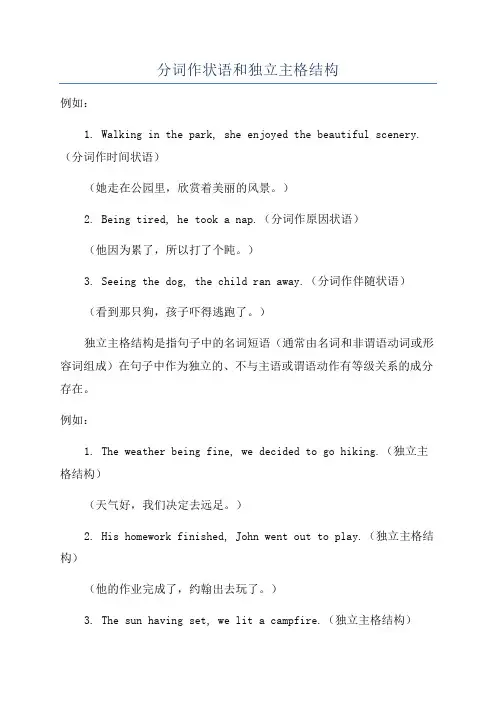
分词作状语和独立主格结构
例如:
1. Walking in the park, she enjoyed the beautiful scenery.(分词作时间状语)
(她走在公园里,欣赏着美丽的风景。
)
2. Being tired, he took a nap.(分词作原因状语)
(他因为累了,所以打了个盹。
)
3. Seeing the dog, the child ran away.(分词作伴随状语)
(看到那只狗,孩子吓得逃跑了。
)
独立主格结构是指句子中的名词短语(通常由名词和非谓语动词或形容词组成)在句子中作为独立的、不与主语或谓语动作有等级关系的成分存在。
例如:
1. The weather being fine, we decided to go hiking.(独立主格结构)
(天气好,我们决定去远足。
)
2. His homework finished, John went out to play.(独立主格结构)
(他的作业完成了,约翰出去玩了。
)
3. The sun having set, we lit a campfire.(独立主格结构)
(太阳已经落山,我们点燃了篝火。
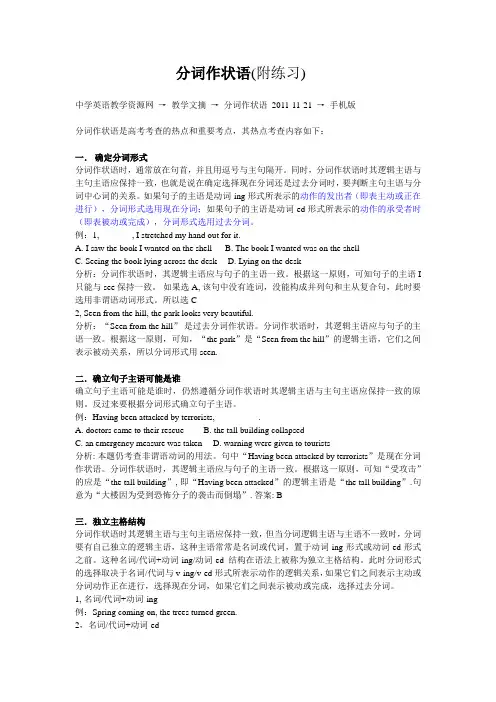
分词作状语(附练习)中学英语教学资源网→教学文摘→分词作状语2011-11-21 →手机版分词作状语是高考考查的热点和重要考点,其热点考查内容如下:一.确定分词形式分词作状语时,通常放在句首,并且用逗号与主句隔开。
同时,分词作状语时其逻辑主语与主句主语应保持一致,也就是说在确定选择现在分词还是过去分词时,要判断主句主语与分词中心词的关系。
如果句子的主语是动词-ing形式所表示的动作的发出者(即表主动或正在进行),分词形式选用现在分词;如果句子的主语是动词-ed形式所表示的动作的承受者时(即表被动或完成),分词形式选用过去分词。
例:1, _______, I stretched my hand out for it.A. I saw the book I wanted on the shellB. The book I wanted was on the shellC. Seeing the book lying across the deskD. Lying on the desk分析:分词作状语时,其逻辑主语应与句子的主语一致。
根据这一原则,可知句子的主语I 只能与see保持一致。
如果选A, 该句中没有连词,没能构成并列句和主从复合句,此时要选用非谓语动词形式。
所以选C2, Seen from the hill, the park looks very beautiful.分析:“Seen from the hill”是过去分词作状语。
分词作状语时,其逻辑主语应与句子的主语一致。
根据这一原则,可知,“the park”是“Seen from the hill”的逻辑主语,它们之间表示被动关系,所以分词形式用seen.二.确立句子主语可能是谁确立句子主语可能是谁时,仍然遵循分词作状语时其逻辑主语与主句主语应保持一致的原则。
反过来要根据分词形式确立句子主语。
例:Having been attacked by terrorists, _________.A. doctors came to their rescueB. the tall building collapsedC. an emergency measure was takenD. warning were given to tourists分析: 本题仍考查非谓语动词的用法。
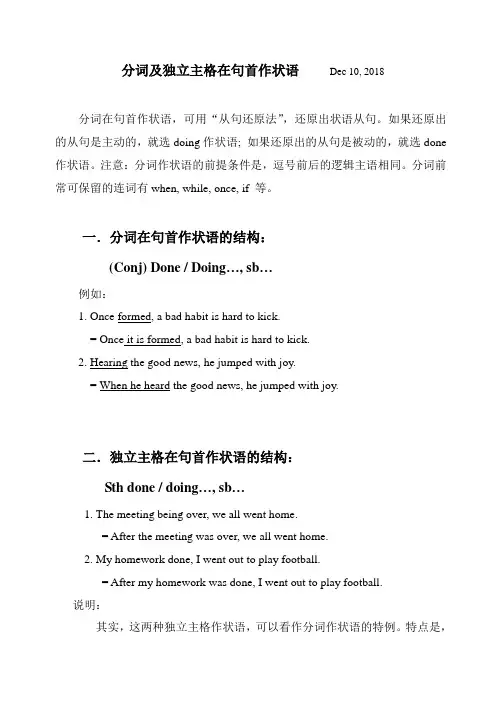
分词及独立主格在句首作状语Dec 10, 2018分词在句首作状语,可用“从句还原法”,还原出状语从句。
如果还原出的从句是主动的,就选doing作状语; 如果还原出的从句是被动的,就选done 作状语。
注意:分词作状语的前提条件是,逗号前后的逻辑主语相同。
分词前常可保留的连词有when, while, once, if 等。
一.分词在句首作状语的结构:(Conj) Done / Doing…, sb…例如:1. Once formed, a bad habit is hard to kick.= Once it is formed, a bad habit is hard to kick.2. Hearing the good news, he jumped with joy.= When he heard the good news, he jumped with joy.二.独立主格在句首作状语的结构:Sth done / doing…, sb…1.The meeting being over, we all went home.= After the meeting was over, we all went home.2.My homework done, I went out to play football.= After my homework was done, I went out to play football.说明:其实,这两种独立主格作状语,可以看作分词作状语的特例。
特点是,分词的前边,保留自己的逻辑主语。
也就是,逗号前后的逻辑主语不一致。
而一般情况下,分词作状语,不保留自己的逻辑主语。
也就是,逗号前后的逻辑主语一致。
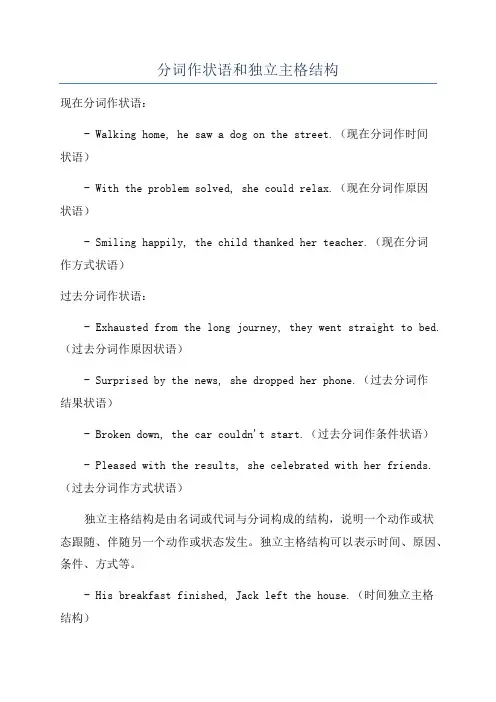
分词作状语和独立主格结构现在分词作状语:- Walking home, he saw a dog on the street.(现在分词作时间状语)- With the problem solved, she could relax.(现在分词作原因状语)- Smiling happily, the child thanked her teacher.(现在分词作方式状语)过去分词作状语:- Exhausted from the long journey, they went straight to bed.(过去分词作原因状语)- Surprised by the news, she dropped her phone.(过去分词作结果状语)- Broken down, the car couldn't start.(过去分词作条件状语)- Pleased with the results, she celebrated with her friends.(过去分词作方式状语)独立主格结构是由名词或代词与分词构成的结构,说明一个动作或状态跟随、伴随另一个动作或状态发生。
独立主格结构可以表示时间、原因、条件、方式等。
- His breakfast finished, Jack left the house.(时间独立主格结构)- The rain stopped, the players continued the game.(条件独立主格结构)- The cake eaten, the children happily played in the garden.(原因独立主格结构)- The teacher angry, the students were silent.(方式独立主格结构)需要注意的是,独立主格结构通常放在句子的开头或结尾,用逗号与主句分隔开来。
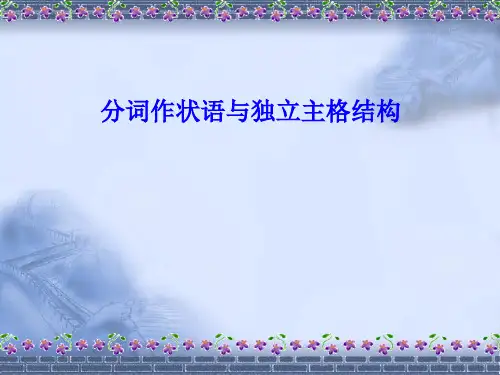
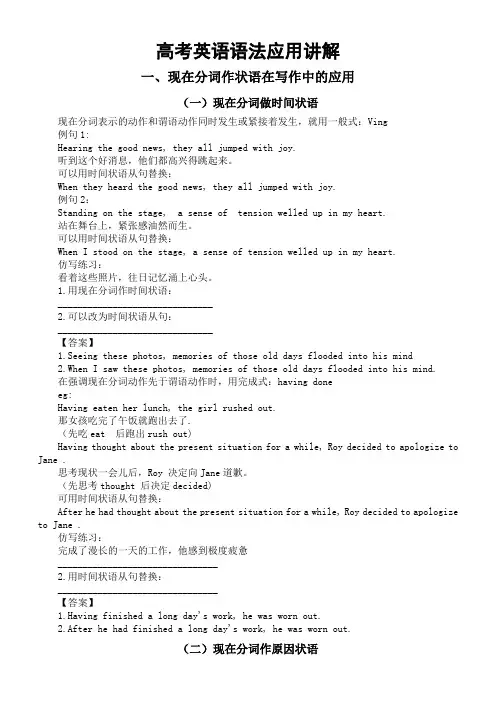
高考英语语法应用讲解一、现在分词作状语在写作中的应用(一)现在分词做时间状语现在分词表示的动作和谓语动作同时发生或紧接着发生,就用一般式:Ving例句1:Hearing the good news, they all jumped with joy.听到这个好消息,他们都高兴得跳起来。
可以用时间状语从句替换:When they heard the good news, they all jumped with joy.例句2:Standing on the stage, a sense of tension welled up in my heart.站在舞台上,紧张感油然而生。
可以用时间状语从句替换:When I stood on the stage, a sense of tension welled up in my heart.仿写练习:看着这些照片,往日记忆涌上心头。
1.用现在分词作时间状语:_______________________________2.可以改为时间状语从句:_______________________________【答案】1.Seeing these photos, memories of those old days flooded into his mind2.When I saw these photos, memories of those old days flooded into his mind.在强调现在分词动作先于谓语动作时,用完成式:having doneeg:Having eaten her lunch, the girl rushed out.那女孩吃完了午饭就跑出去了.(先吃eat 后跑出rush out)Having thought about the present situation for a while, Roy decided to apologize to Jane .思考现状一会儿后,Roy 决定向Jane道歉。
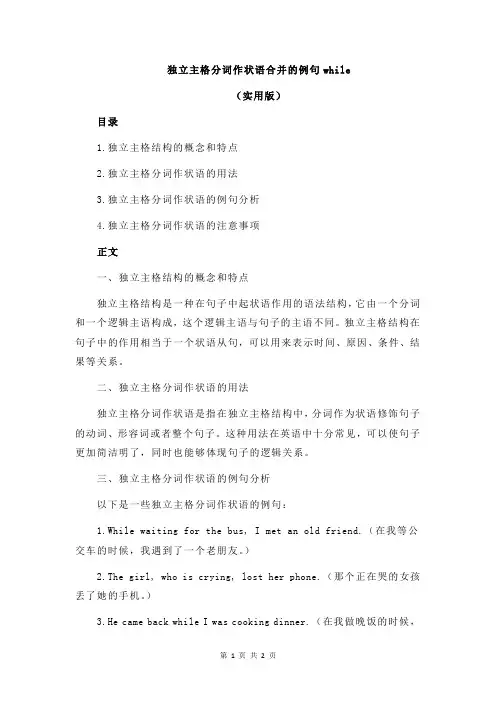
独立主格分词作状语合并的例句while(实用版)目录1.独立主格结构的概念和特点2.独立主格分词作状语的用法3.独立主格分词作状语的例句分析4.独立主格分词作状语的注意事项正文一、独立主格结构的概念和特点独立主格结构是一种在句子中起状语作用的语法结构,它由一个分词和一个逻辑主语构成,这个逻辑主语与句子的主语不同。
独立主格结构在句子中的作用相当于一个状语从句,可以用来表示时间、原因、条件、结果等关系。
二、独立主格分词作状语的用法独立主格分词作状语是指在独立主格结构中,分词作为状语修饰句子的动词、形容词或者整个句子。
这种用法在英语中十分常见,可以使句子更加简洁明了,同时也能够体现句子的逻辑关系。
三、独立主格分词作状语的例句分析以下是一些独立主格分词作状语的例句:1.While waiting for the bus, I met an old friend.(在我等公交车的时候,我遇到了一个老朋友。
)2.The girl, who is crying, lost her phone.(那个正在哭的女孩丢了她的手机。
)3.He came back while I was cooking dinner.(在我做晚饭的时候,他回来了。
)在这些例句中,分词作为状语,分别表示时间、原因和伴随状况,使句子更加简洁明了。
四、独立主格分词作状语的注意事项在使用独立主格分词作状语时,需要注意以下几点:1.独立主格结构中的逻辑主语必须与句子的主语不同,否则就不是独立主格结构。
2.分词作为状语时,它的逻辑主语必须与句子的主语保持一致,否则会造成歧义。
3.在一些情况下,独立主格结构可以转化为定语从句,但有时独立主格结构更加简洁明了。
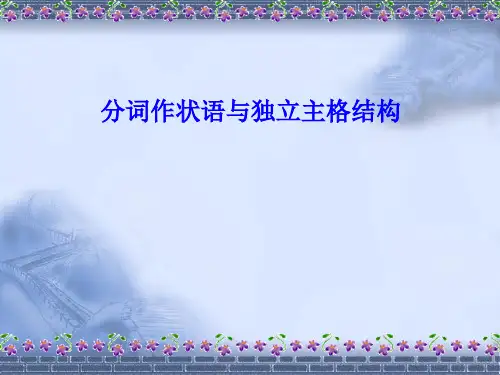

Unit 6 Participle Used as Adverb and Absolute Construction分词做状语和独立主格Language Notes判断: After opening the book, the pages had been torn away. 错Hearing the bad news, his eyes were filled with tear. 错Exercise 1将下列句子在不改变原意的前提下,做适当的省略.1.While studying at college, Miss Leacock had her first novel published.2.The old lady carrying a basketful of eggs was run down by a taxi when crossing the street.3.I am sure Mr. Witie’s latest play, once staged, will proved to be a great success.4.After shoplifting for many years, Jennifer was found out.5.Since being promoted, I’ve had no time to go out.6.If being accepted for the job, I’ll have to start at the beginning of next month.7.Unless being destroyed, this material may have damaging consequences.Exercise 2用现在分词或过去分词(或Not+现在/过去分词)从句开头改写下面的句子.1.Marie left work early, not feeling too well.2.Impressed by Jo’s work, he extended her contract for a year.3.Having acquired the money through hard work, he was reluctant to give it away.4.Having started the course, Alan decided to complete it.5.Not wanting to offend him, we said nothing about his paintings.Exercise 3用所给动词的“Having+过去分词”形式填空.Arrive climb spend take work1.Having taken2.Having spent3.Having worked4.Having spent5.Having workedThe headmaster came into the room, followed by the teacher.伴随Deeply moved, he thanked her again and again.原因United, we stand; divided, we fall. 原因Knowing all this, they still insisted on my paying for the damage.让步It rained heavily, causing severe flooding in that area.结果Climbing to the top of the tower, we saw a magnificent view.原因He ran up to her, breathing heavily.结果Exercise 4用现在分词, having+过去分词或过去分词从句,或(not+-ing等)开头,分别把下面的句子先配对,再写成一句话.DCFEBBeing a doctor, she knew what side-effects the medicine could have.Not expecting anyone to be in the house, I walked straight in.Having been painted in dark colors, the room needed some bright lights.Unemployed, He had time to consider what job he really wanted.Not speaking Italian, I found life in Sicily difficult.Having been a teacher for 14 years, she knew how to keep children interested.Exercise 5用分词作状语改写下列句子1.Overlooking the sea, the bedrooms are the best ones in the hotel.2.Read by people all over the world, her books are still immensely popular.3.Always dominated by the same people, the committee meetings were slow-moving andineffectual.指出下述独立主格各起什么作用?His voice drowned by the noise, the speaker interrupted his lecture. 原因He went off, knife in hand.伴随His homework done, Jim decided to go and see the play.原因The last bus having gone, we had to walk home.原因Weather permitting, the basketball game will be held on Wednesday.条件Exercise 5 完成下列句子The car turning across the corner(汽车转过拐角), we caught the sight of the spires of the church. The river water being polluted(河水被污染了), the farmers could only drink well water.Time permitted(时间允许的话), I will reply to you in a week.He left his home town, his heart left there (心却留在了这里)That boss looked in my direction, his assistant whispering to him(他的助手对他耳语着什么.)Homework:选择:BDACC DCBCD翻译:1.Hearing the kid crying in the garden, mother walked out of the room immediately.2.Thinking of the possibility to be late, I decided to take taxi.3.They are a party, singing and dancing.4.All the money having been used up, we began to look for a job.5.Seeing him walking to me, I hurried to hide behind the door.6.He stood up suddenly, holding the gun in hand.7.The monitor being ill, we have to delay the meeting.8.His arms folded across the chest, he stood there.9.The summer vacation ending, the city street become even busier.10.We walking into the forest, his father acted as our guide.填空:Being absent leaving rolling riding/shooting wearing lying working running本单元主要内容掌握程度自评:内容掌握良好掌握一般我的疑问分词作状语和独立主格●Vincent Van Gogh●分词作时间状语●分词作原因状语●分词作让步状语●分词作伴随状况●分词作条件状语●分词的否定形式●分词状语的时态●现在分词的独立主格●过去分词的独立主格●Homework。
独立主格结构与过去分词作状语的区别在中文语法中,有一些结构和用法可能会让人感到困惑,尤其是在写作中。
其中,独立主格结构和过去分词作状语就是两个易混淆的地方。
本文将深入探讨这两种结构的区别,并且帮助读者更好地理解和运用它们。
1. 独立主格结构独立主格结构是指一个句子中的独立成分,通常由名词或代词与动词的-ing形式构成,用来表示时间、原因、条件、伴随等关系。
其作用是对整个句子进行修饰和补充说明,增加句子的信息量和表达的灵活性。
举个例子:- 雨停了,天晴了,我们整个人都变得轻松起来。
在这个句子中,“天晴了”是主要句子,“雨停了”是独立主格结构,表示时间上的先后关系,并且强调了天气转好后人们的心情也随之改变。
2. 过去分词作状语过去分词作状语是指动词的过去分词形式用来修饰主句或从句,表示时间、原因、条件、方式、结果等。
过去分词作状语通常与所修饰的动词有逻辑上的动宾关系,能够对动作进行修饰和说明。
举个例子:- 他饿了,所以走进了一家餐厅。
在这个句子中,“饿了”是过去分词作状语,表示原因,修饰并解释了他走进餐厅的动作。
过去分词作状语丰富了句子的表达方式,使语言更加生动。
3. 区别与联系独立主格结构和过去分词作状语在形式上有些相似,都是由名词或代词加动词-ing形式构成,而且在句子中都起到修饰和补充的作用。
但它们的使用场景和功能有所不同。
独立主格结构更加独立完整,在句子中可以独立成段,表达一种自成体系的含义。
过去分词作状语则更加依赖于所修饰的动词,是动作的一部分,起到对动作的说明和补充的作用。
4. 个人观点在实际写作中,独立主格结构和过去分词作状语的正确使用可以丰富句子的表达,增加句子的层次感和表现力。
对于作者来说,理解它们的区别和联系,能够帮助我们更好地灵活运用这两种结构,写出具有深度和广度的文章。
对于读者来说,掌握这些语法知识也能够帮助我们更好地理解文章的含义,提升阅读理解能力。
总结回顾通过本文的讨论,我们对独立主格结构和过去分词作状语有了更深入的理解。
分词作状语与独立主格结构一、分词作状语1.动名词作状语动名词作状语常用于表示动作的方式、原因、结果等。
- 动作原因:He was late for work because of oversleeping.(他睡过头了,所以上班迟到了。
)- 动作结果:The car stopped running, causing a traffic jam.(汽车停了下来,导致了交通堵塞。
)2.现在分词作状语现在分词作状语常用于表示动作的时间、条件、原因、伴随等。
- 动作时间:Walking in the park, he met his old friend.(他在公园散步时遇到了他的老朋友。
)- 动作条件:Unless given permission, you cannot enter the building.(除非得到许可,否则你不能进入建筑物。
)- 动作原因:His face turned pale, feeling sick.(他感觉不适,脸色变得苍白。
)- 动作伴随:She burst into tears, seeing the sad news.(她看到这个悲伤的消息时,忍不住哭了起来。
)二、独立主格结构独立主格结构是指句子中的现在分词或过去分词作为非限制性状语,与主语关系疏远,独立于主句的结构。
独立主格结构一般用于表示时间、原因、条件、伴随等含义。
1.现在分词作独立主格结构现在分词作独立主格结构时,其逻辑主语通常与主句的主语不同,表示主句动作发生的时间、条件、原因、伴随等。
- 动作时间:The sun having set, we decided to go home.(太阳已经下山,我们决定回家。
)- 动作条件:The weather being fine, we went for a walk.(天气好的时候,我们去散步了。
)- 动作原因:Her husband having lost his job, she had to support the family.(她丈夫失业了,她不得不养家糊口。
分词作状语分词和分词短语作状语时,可以表示时间、原因、条件、让步、方式和伴随情况。
在表示时间、原因、条件、让步和方式时,通常可转换为相应的状语从句,表示方式和伴随情况时,可以转换为一个并列的谓语成分。
例如:Seeing the teacher entering the room,the students stood up.(=When the students saw the teacher entering the room,they stood up.)学生们看见老师走进房间,都站了起来。
Heated,ice will be changed into water.(=When it is heated...)当冰加热时,它就会变成水。
(条件、时间)Being excited,I couldn’t go to sleep.(=As I was excited,I couldn’t go to sleep.)我兴奋得睡不着觉。
(原因)I stood there,listening to the broadcast.(=I stood there and listened to the broadcast.)我站在那儿听广播。
(伴随)The children went away laughing.(=The children went away.They laughed as they went.)孩子们笑着走开了。
(行为方式)Knowing all this,they made me pay for the damage.(=Although they know all this...)他们尽管了解这一切,还是要我赔偿损失。
(3)分词作状语与主语的关系。
A. 现在分词作状语时,现在分词的动作就是句子主语的动作,它们之间的关系是主动关系。
例如:He went out shutting the door behind him.他出去后将门随手关上。
独立主格分词作状语合并的例句while摘要:I.独立主格分词作状语的概述- 独立主格分词作状语的定义- 独立主格分词作状语的语法功能II.独立主格分词作状语的例句- while 引导的独立主格分词作状语的例句- 其他引导词引导的独立主格分词作状语的例句III.独立主格分词作状语的合并方法- 合并的定义- 合并的方法及注意事项IV.独立主格分词作状语在实际应用中的优势与局限- 优势- 局限正文:独立主格分词作状语是英语中一种特殊的状语形式,它由一个分词结构(包括动词和其宾语)和一个主语构成,分词结构在句中扮演状语的角色,主语则独立存在。
这种结构在英语中有着广泛的应用,可以用来表示时间、原因、条件等多种关系。
在英语中,独立主格分词作状语可以通过不同的引导词来引导,如while、when、if 等。
其中,while 引导的独立主格分词作状语在英语中十分常见。
例如:While I was walking in the park, I met my friend.在这个例子中,while 引导的独立主格分词作状语“I was walking in the park”表示时间关系,即“我在公园散步的时候遇到了我的朋友”。
除了while 之外,还有其他引导词可以引导独立主格分词作状语,如:- When I entered the room, she was reading a book.- If he rains, we will stay at home.在实际应用中,独立主格分词作状语有着明显的优势。
首先,它可以使句子更加简洁,避免重复使用主语。
其次,它可以清晰地表达出句子中不同成分之间的关系,使句子更加连贯。
然而,独立主格分词作状语也存在一些局限。
首先,它要求分词结构和主语之间有明确的逻辑关系,否则可能会造成句子的混乱。
其次,由于分词结构在句中扮演状语的角色,因此它不能影响句子的时态和语态等语法特征。
总的来说,独立主格分词作状语是一种十分灵活和实用的英语表达方式。
分词作状语:
分词和分词短语作状语时,可以表示时间、原因、条件、让步、方式和伴随情况。
在表示时间、原因、条件、让步和方式时,通常可转换为相应的状语从句,表示方式和伴随情况时,可以转换为一个并列的谓语成分。
例如:Seeing the teacher entering the room,the students stood up.(=When the students saw the teacher entering the room,they stood up.)
Heated,ice will be changed into water.(=When it is heated...)
Being excited, I couldn’t go to sleep.(=As I was excited,I couldn’t go to sleep.)
I stood there, listening to the broadcast.(=I stood there and listened to the broadcast.)
The children went away laughing.(=The children went away.They laughed as they went.)
Knowing all this,they made me pay for the damage.(=Although they know all this...
(3)分词作状语与主语的关系。
A. 现在分词作状语时,现在分词的动作就是句子主语的动作,它们之间的关系是主动关系。
例如:He went out shutting the door behind him.
Not knowing what to do, he went to his parents for help.
B. 过去分词作状语时,过去分词表示的动作是句子主语承受的动作,它们之间的关系是被动关系。
例如:Given more attention,the trees could have grown better.
F aced with difficulties,we must try to overcome them.
(4)分词作状语时前面可用连词。
when,while,once,if,unless,though等引导的状语从句,若其主语与主句主语相同时,可保留该副词连接词,其余部分则化简为分词短语。
例如:When (being) free,I’ll fetch you.
While walking along the street early in the morning,he saw her.
If falling ill,I’ll see my doctor.如果生病我会去看医生。
Once completed,this power station supplies the nearby towns and villages with electricity.
Even though given every opportunity,they would not try.
Though knowing the truth,he remained silent.
Unless (being) rich,I am not going abroad.
(5)分词作状语时,要特别注意其逻辑主语须和谓语动词的主语一致,否则分词必须有自己的主语。
这种带主语的分词结构称作分词的独立结构,或独立主格。
例如:The rain having stopped,the soldiers continued their match.
The boys returned,their face covered with sweat.
〈注〉有时也可用“with(或without)+名词(或代词宾格)+分词”的结构,表示伴随情况。
例如:He fell asleep with the lamp burning.
The teacher entered the classroom,with a bag (being)in his hand.
(6)分词作连词引导状语从句。
这些分词有:provided (or provided that),providing that, supposing,seeing (that), considering等。
例如:You can arrive in Beijing earlier for the meeting provided you don’t mind taking the night train.
I’ll go,providing you go too.
Supposing it rains,what shall we do?
Seeing (that) s he is old enough to get married,I don’t think you can stop her.
Considering he has been learning English only for a year,he speaks it quite well.
(7)动词不定式和分词作状语的区别。
A. 分词作状语一般表示伴随,而不定式常常表示目的。
例如:They stood by the roadside talking about the plan.他们站在路边谈论着这个计划。
(伴随)
They stood by the roadside to talk about the plan.他们站在路边,为的是谈论这个计划。
(目的)
B. 分词作状语放在句子开头,除表示原因之外,有时表示时间或条件。
动词不定式作状语时,除了表示目的以外,还表示结果或原因。
例如:Reading attentively,he forgot the time for lunch.由于在专心读书,他忘了吃午饭的时间。
(原因)
Reading carefully,he found something he had not known before.他仔细读书时,发现了一些从前不知道的东西。
(时间)
Reading carefully,you’ll learn something new. 只要你仔细阅读,你会学到一些新的东西。
(条件)
His family was too poor to support him.他的家庭太穷,不能维持他的生活。
(结果)
The boy is not tall enough to reach the book shelf. 这男孩个子不够高,手伸不到书架。
(结果)
We are glad to hear the news.我们很高兴听到这消息。
(原因)
2) 现在分词和过去分词作状语时的用法比较
不管是现在分词还是过去分词作状语,如果单独作状语,其逻辑主语必须和主句的主语一致。
分词作状语通常可以转换成一个相应的状语从句,如果状语从句中的谓语动词为被动结构,就用过去分词;如果状语从句中的谓语动词为主动结构,就用现在分词。
有时为了强调,分词前可带连词when, while, if, though, as if, unless 等一起作状语,以便使句子的意思更清楚、更连贯。
例如:
Working hard (If you work hard), you will succeed.
如果你努力,你会成功的。
[b] Defeated (= Though he was defeated), he remained a popular boxer.
虽然他被击败了,但他仍然是一个受人喜爱的拳击手。
独立主格
(一):独立主格结构的构成:
名词(代词)+现在分词、过去分词;
名词(代词)+形容词;
名词(代词)+副词;
名词(代词)+不定式;
名词(代词) +介词短语构成。
(二)独立主格结构的特点:
1)独立主格结构的逻辑主语与句子的主语不同,它独立存在。
2)名词或代词与后面的分词,形容词,副词,不定式,介词等是主谓关系。
3)独立主格结构一般有逗号与主句分开。
举例:
The test finished, we began our holiday.
= When the test was finished, we began our holiday.
The president assassinated, the whole country was in deep sorrow.
= After the president was assassinated, the whole country was in deep sorrow. Weather permitting, we are going to visit you tomorrow.
This done, we went home.
The meeting gone over, everyone tired to go home earlier.
He came into the room, his ears red with cold.
He came out of the library, a large book under his arm.。